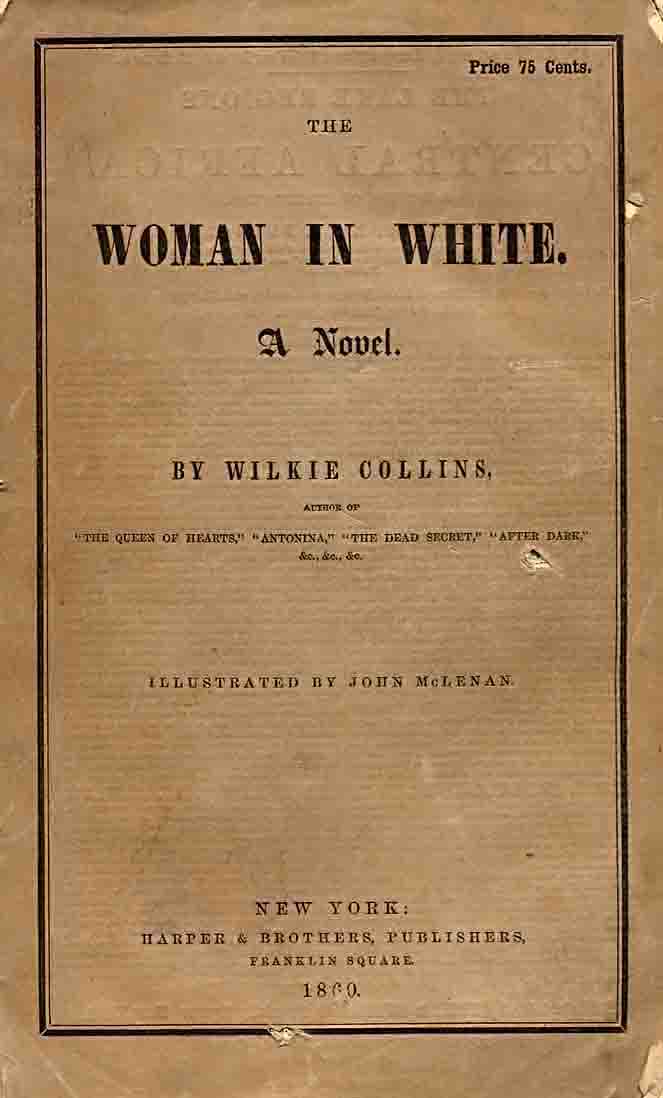
New York, Harper and Brothers, 1860
from TheWoman in White
THE STORY BEGUN BY WALTER HARTRIGHT
(of Clement's Inn, Teacher of Drawing)
. . .
I had now arrived at that particular point of my walk where four roads met—the road to Hampstead, along which I had returned, the road to Finchley, the road to West End, and the road back to London. I had mechanically turned in this latter direction, and was strolling along the lonely high-road—idly wondering, I remember, what the Cumberland young ladies would look like—when, in one moment, every drop of blood in my body was brought to a stop by the touch of a hand laid lightly and suddenly on my shoulder from behind me.
I turned on the instant, with my fingers tightening round the handle of my stick.
There, in the middle of the broad bright high-road—there, as if it had that moment sprung out of the earth or dropped from the heaven—stood the figure of a solitary Woman, dressed from head to foot in white garments, her face bent in grave inquiry on mine, her hand pointing to the dark cloud over London, as I faced her.
I was far too seriously startled by the suddenness with which this extraordinary apparition stood before me, in the dead of night and in that lonely place, to ask what she wanted. The strange woman spoke first.
"Is that the road to London?" she said.
I looked attentively at her, as she put that singular question to me. It was then nearly one o'clock. All I could discern distinctly by the moonlight was a colourless, youthful face, meagre and sharp to look at about the cheeks and chin; large, grave, wistfully attentive eyes; nervous, uncertain lips; and light hair of a pale, brownish-yellow hue. There was nothing wild, nothing immodest in her manner: it was quiet and self-controlled, a little melancholy and a little touched by suspicion; not exactly the manner of a lady, and, at the same time, not the manner of a woman in the humblest rank of life. The voice, little as I had yet heard of it, had something curiously still and mechanical in its tones, and the utterance was remarkably rapid. She held a small bag in her hand: and her dress—bonnet, shawl, and gown all of white—was, so far as I could guess, certainly not composed of very delicate or very expensive materials. Her figure was slight, and rather above the average height—her gait and actions free from the slightest approach to extravagance. This was all that I could observe of her in the dim light and under the perplexingly strange circumstances of our meeting. What sort of a woman she was, and how she came to be out alone in the high-road, an hour after midnight, I altogether failed to guess. The one thing of which I felt certain was, that the grossest of mankind could not have misconstrued her motive in speaking, even at that suspiciously late hour and in that suspiciously lonely place.
"Did you hear me?" she said, still quietly and rapidly, and without the least fretfulness or impatience. "I asked if that was the way to London."
"Yes," I replied, "that is the way: it leads to St. John's Wood and the Regent's Park. You must excuse my not answering you before. I was rather startled by your sudden appearance in the road; and I am, even now, quite unable to account for it."
"You don't suspect me of doing anything wrong, do you? I have done nothing wrong. I have met with an accident—I am very unfortunate in being here alone so late. Why do you suspect me of doing wrong?"